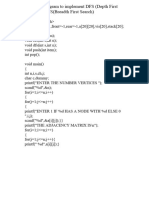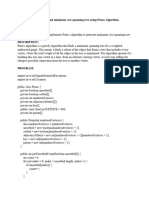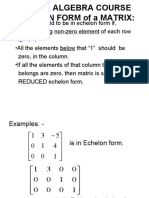0% found this document useful (0 votes)
24 views7 pagesAssignment 4
The document contains code implementations for the Fractional Knapsack and Prim's algorithms in C++. It includes detailed steps for both algorithms, including input handling, sorting, and calculating maximum values or minimum spanning trees. Additionally, it provides a structured outline of the algorithms' processes.
Uploaded by
AnuragCopyright
© © All Rights Reserved
We take content rights seriously. If you suspect this is your content, claim it here.
Available Formats
Download as DOCX, PDF, TXT or read online on Scribd
0% found this document useful (0 votes)
24 views7 pagesAssignment 4
The document contains code implementations for the Fractional Knapsack and Prim's algorithms in C++. It includes detailed steps for both algorithms, including input handling, sorting, and calculating maximum values or minimum spanning trees. Additionally, it provides a structured outline of the algorithms' processes.
Uploaded by
AnuragCopyright
© © All Rights Reserved
We take content rights seriously. If you suspect this is your content, claim it here.
Available Formats
Download as DOCX, PDF, TXT or read online on Scribd
/ 7























































































